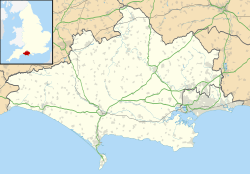Shearplace Hill Enclosure facts for kids
| Location | near Cerne Abbas, Dorset |
|---|---|
| Coordinates | 50°47′8″N 2°30′43″W / 50.78556°N 2.51194°W |
| Area | 0.5 hectares (1.2 acres) |
| History | |
| Periods | Bronze Age |
| Designated | 30 April 1957 |
| Reference no. | 1002766 |
The Shearplace Hill Enclosure is an exciting archaeological site from the Bronze Age. It's located about 1.5 miles (2.4 km) southwest of a village called Cerne Abbas in Dorset, England. This site is so important that it's protected as a scheduled monument. This means it's a nationally important historical place that must be preserved.
What is Shearplace Hill Enclosure?
Shearplace Hill is a special type of ancient settlement called a Martin Down style enclosure. It's named after a similar Bronze Age site found on Martin Down in Hampshire. These types of enclosures were usually homes or small villages. Most of them have been found on the downland (rolling hills) in central southern England. They were often built on the sides of hills.
Location and Features
The site covers about 0.5 hectares (1.2 acres) (which is about the size of one football field). It sits on a north-facing slope of Shearplace Hill. From here, you can look west over the valley of Sydling Water.
At the site, you can see several interesting features:
- There are a series of banks that are up to 1.2 metres (3 ft 11 in) (about 4 feet) high. These might have been walls or boundaries.
- There are also sunken trackways that are up to 1.7 metres (5 ft 7 in) (about 5.5 feet) deep. These were like ancient roads or paths.
Discoveries from Excavation
In 1958, an archaeologist named Philip Rahtz led an excavation at Shearplace Hill. During this dig, he made some important discoveries:
- He found that the site was once a farmstead with several enclosed areas.
- The main enclosure contained two round houses. These were likely where people lived.
- The farmstead was used during the Middle to Late Bronze Age. After that, it was abandoned.
Archaeologists also found many objects during the excavation. These finds help us understand what life was like back then:
- Pottery from the Deverel–Rimbury culture. This shows who lived there and how they made pots.
- Loom weights. These were used for weaving cloth, telling us people made their own clothes.
- Flint scrapers. These tools were used for cleaning animal hides or preparing food.
- Animal bones. These bones give clues about the animals people raised or hunted for food.


